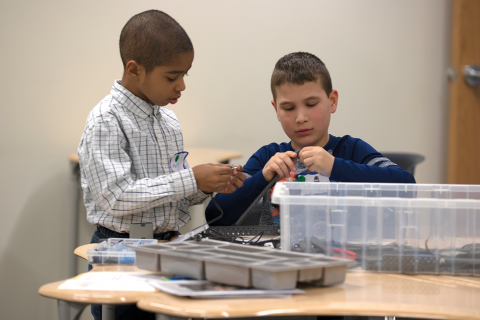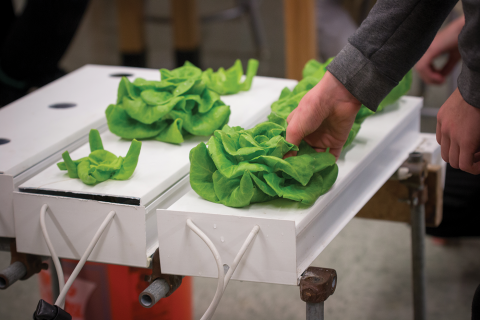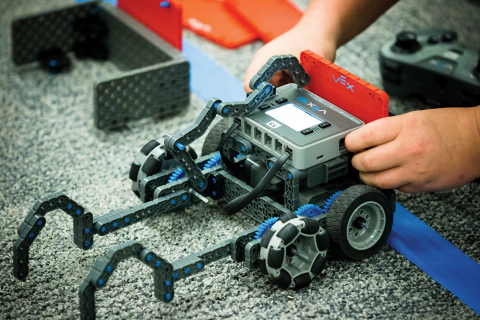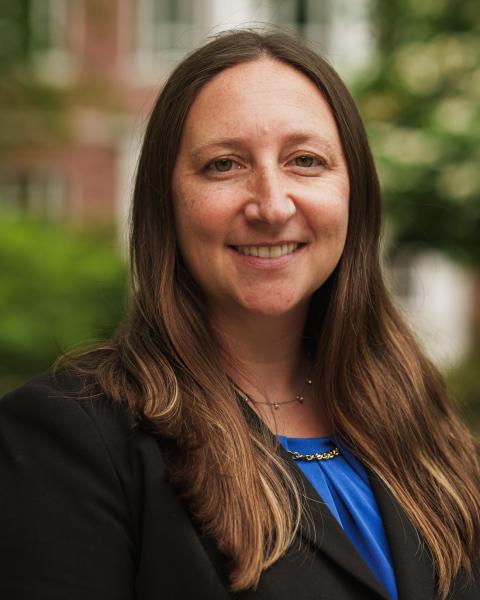STEM is for Everyone

When one child looks up at the night sky, she might see constellations outlined in clear, twinkling stars. Another child’s view could be obstructed by light pollution.
Some children have two parents to help with homework; others might be on their own.
There are many factors that can serve as learning barriers for students at every level. To ensure that every child has the chance to succeed, STEM program managers and educators in New Hampshire are focused on creating equitable educational opportunities for underserved populations.
STEM in the Country
To combat negative impacts resulting from COVID-19 on rural New Hampshire educators and students, the National Institute of Food and Agriculture has granted $685,000 to support UNH Extension’s work.
The 4-H Northeast Collaborative: Closing the Gap initiative brings remote, agriculture- based STEM learning experiences to students through training, volunteer support and classroom resources for educators. The program will serve 1,500 youth and teachers across rural parts of northern New England while cementing a partnership among three land grant universities — the University of New Hampshire, the University of Vermont and University of Maine.
Kate Guerdat, principal investigator and state 4-H leader/4-H youth development state specialist for UNH Extension, says, “We are excited to see the impact this program will have on the educational, social and emotional challenges that have been exacerbated by remote learning and the heightened anxiety caused by the COVID-19 pandemic.”
STEM in the City
Meanwhile, efforts have been building for years to increase participation in these fields of study at the STEM Discovery Lab at UNH Manchester, run by UNH Extension Field Specialist for Science Literacy Sarah Grosvenor. One of the lab’s hallmark programs, the annual 4-H Science Bonanza, provides a way for families to learn about other STEM opportunities for youth and adults offered throughout the year by the STEM Discovery Lab. Through this experiential day of learning, students ages 5-13 can develop new skills like how to grow food through hydroponics, make maple syrup or build a kinetic sculpture.

“Beyond running programs for youth and adults, the STEM Discovery Lab also inspires youth to feel confident in themselves as scientists or engineers. We bring excitement and energy to the topics we teach, and hopefully through events like the Science Bonanza youth will continue to participate in our programs,” says Grosvenor.
To connect with the local community, the lab has joined forces with the Granite United Way Youth Enrichment Partnership, which brings together 14 youth-serving organizations and the Manchester School District under a hub and spoke model – the hubs are places that youth frequent like schools, after-school programs and summer camps; the spokes are evidence- based interventions that support academics, soft skills and health behaviors.
President and CEO of the Granite United Way Patrick Tufts explains that this groundbreaking partnership reduces barriers, such as transportation and cost, to critical services and learning opportunities for low-income middle school youth and their families. About collaborating with the STEM programming at UNH Manchester, he says, “By working together, and ensuring transportation was no longer a barrier, hundreds of youth gained insight and experience in the STEM fields. This access has been life-changing for many, sparking inspiration and engagement in the fields of study they may not have been exposed to without this important partnership.”
Having adult mentors also remains an important component of STEM education. One of the goals of the STEM Docent program, which hosts classes at the Manchester lab, is to help increase youth in the state’s STEM career pipeline by training adult volunteers who have a background and passion for STEM. UNH Extension STEM Docent Program Manager Megan Glenn explains, “What we really do is inspire those ‘ah-ha’ moments to go off in a kid’s head — those moments when they realize that they are capable of science and engineering and that mastering these subjects is attainable.”
Building Equity Leaders for STEM
In addition to providing programming, UNH understands the importance of building capacity. That understanding has led to a $1.49 million grant from the National Science Foundation’s Robert Noyce program to fund a program called Building Equity Leaders for STEM in New Hampshire (BELS in N.H.) that engages partners from Manchester, Nashua and Rochester school districts as well as two professional organizations, the N.H. Teachers of Mathematics and the N.H. Science Teachers Association, which serve K-12 teachers in the state. The five-year grant will support 15 STEM teachers to build their leadership skills, equity pedagogies and STEM content knowledge and instruction.

“It’s never been more important for all New Hampshire students to have access to high- quality STEM education,” says principal investigator Lara Gengarelly, UNH Extension specialist and affiliate associate professor for science education in UNH’s Joan and James Leitzel Center for Mathematics, Science and Engineering Education. “Given the performance disparities in STEM subjects across different populations of students, changing demographics and pockets of poverty in New Hampshire school districts, supporting teachers as leaders in STEM and and equity education is essential work that UNH is well-suited to lead.”
